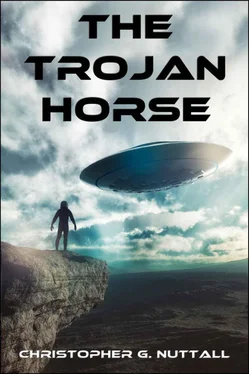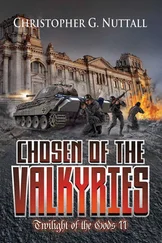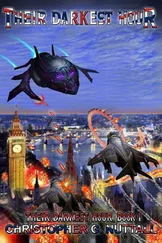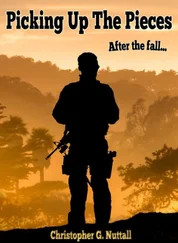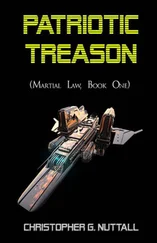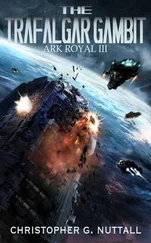Jayne nodded. She’d covered human interest stories back in the days when she’d been a cub reporter. Even the honest and decent folks living in poor areas tended to view the police as their natural enemy, tools of a shadowy government that was prepared to interfere in their lives, but not to do anything to actually help them. There were a dozen theories as to why that was the case — Jayne believed that it had something to do with low sentences and lack of discipline — yet it hardly mattered. The bottom line was that the murderer would probably go unnoticed.
“He worked for the BAN,” she said, changing the subject slightly. Most policemen loved the BAN; hell, a number of bloggers were policemen. That was technically a violation of their service agreements, but they’re done excellent work exposing the stupidities of rules and regulations imposed by men who never walked the streets while wearing their uniforms. “Would we be able to get access to his computer files?”
“I’d have to check,” the policeman said. Jayne moved, just slightly, to show him another centimetre of cleavage, but it didn’t change his mind. “The stiff left behind no will; we wouldn’t even have known about his death if he hadn’t left a key with his former girlfriend. She came to pick up some of her stuff from his flat and found his dead body. I’m afraid that she had hysterics and we had to remove her to a hospital. I think his parents will wind up with his gear; perhaps they could let you have access…”
Jayne thanked him and walked away, heading down the stairs to the streets below. It was a blustery cold day in Washington, with hints of rain falling from the sky to the ground. She shivered and pulled her coat around her as the wind blew stronger, pushing against her. As a child, she’d feared the wind; now, she looked up into the gloomy sky and wondered what was lurking high overhead. The observatories said that the alien starships could be seen with the naked eye, but Washington was too bright a city for anyone to have any hope of picking out a single light high overhead.
Every reporter dreamed of stumbling onto a story that would make their names famous over the entire world. Journalists still studied the Watergate story, where a team of journalists had discovered a trail that led all the way back to President Nixon himself. America had lost her innocence that day, Jayne considered; the day when they’d discovered that even the highest in the land could be brought low by the media. It had been the day when the media had started to shift from reporting the truth to scrutinising everything the government said, convinced that the government had to be lying to cover up dark intentions…
There was no conspiracy, she knew. Nine times out of ten, there was no conspiracy; the government truly was as incompetent as it had seemed. And yet people still believed in the most insane conspiracy theories, from the American government having known about the 9/11 plot and doing nothing to the American government actually carrying out the bombing itself. It seemed to her that the people who chose to believe such insane theories were actually looking for a kind of reassurance, a sense that even if something had gone wrong, someone was still in control. The idea that screw-ups happened anyway terrified them.
But maybe there was a conspiracy after all. A number of people who happened to hold anti-alien views were dead — and no one had been arrested or seemed likely to be arrested for the crime. And that suggested that the killers were professional assassins, trying to disguise the murders behind simple ‘robberies gone wrong.’ And who benefited from that? Only one answer came to mind.
Stepping into a shop entrance to escape the wind, she pulled her cell phone out of her pocket and called an old friend. He was curious, but agreed to meet her without asking any more questions. If she was right — and if cell phone networks were being monitored — saying the words out loud might just make her the next statistic in a murder investigation.
* * *
They met at Kent’s Bar and Grill, a deafeningly loud eatery that catered to Washington’s students and junior workers. It was difficult to hold any kind of civil conversation over the music, but it should have the effect of making it very difficult for anyone to overhear their words. Besides, there were enough distractions in the crowded bar to make it very difficult for someone to peer into their corner without being blindingly obvious.
Vincent Felt had shared a journalism class with her, back before they’d both graduated and he’d gone to work for the New York Times . He’d always had a little crush on her, which Jayne had exploited ruthlessly from time to time. The BAN might be growing, but it didn’t have the same level of access possessed by the Grey Lady — and besides, many people thought that the internet wasn’t quite real. He was a tall man tending towards obesity, a trend encouraged by the large plate of nachos and salsa he was devouring while talking to her.
“The word’s come down from on high,” he said, as he held out a dripping nacho for her. Jayne took one look at the cheese oozing off it and shook her head. She’d contented herself with fries and a coke. “The aliens are friendly and the human race should commit themselves to the Galactic Federation.”
Jayne scowled as she took a sip of coke. Most of the deaths also had one other thing in common; almost all of the victims used modern media like the internet, rather than old-fashioned print media or even television. She’d expected more interest from the newspapers, but it seemed as if the fix was in already. Reporters didn’t get anything like as much freedom of action as the public generally assumed. Only a complete fool of a reporter would push a story forward knowing that his editor — or senior management — would disapprove. The stories the public were told might bear only a slight resemblance to the truth, or might ignore the truth altogether. It was very rare for a story to be reported with the emotional detachment that was the key to true reporting.
“I see,” she said. “And who issued the order?”
“It came down from senior management,” Felt explained. He swallowed another nacho and burped contently. “The editing staff weren’t too chuffed about it, I can tell you. They normally get to decide how to slant the story themselves.”
Jayne nodded. “Is there anyone in the political field being pushed forward?”
“Not as far as we can tell,” Felt admitted. “We have orders to promote the causes of politicians who have verbally committed themselves to supporting the Galactics — and mankind’s efforts to get into their Federation. Those who refuse to support the Galactics…”
He didn’t need to finish the sentence. They both knew that a carefully-placed story, just one hair short of libel, could destroy a political career. There were plenty of politicians whose only fault had been irritating the media — and discovered that their side of the story was being presented with a magnifying glass held over his flaws. A written story always had more influence than the internet, although that might be changing. The newer generations were far more comfortable with the internet than their parents — and why should they allow editing staff to decide what they wanted to watch?
“Clever,” Jayne said. She was starting to have a very bad feeling about the whole thing. Part of her was tempted to bring Felt into her confidence, but one of the reasons he would never make it into the BAN was because he hated to question authority. Anything she gave him would end up in front of his superiors — where, if she were lucky, it would merely be dumped in the waste paper bin. “Thank you for your help.”
Читать дальше
